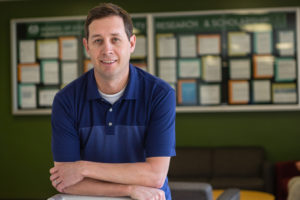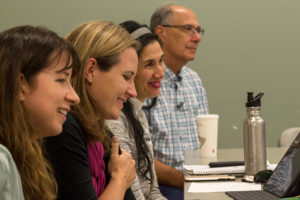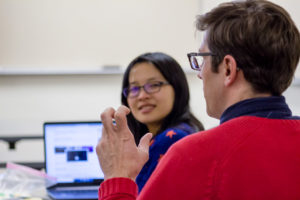Student writer Andrea Day contributed to this story.

Recently, one of the School of Education doctoral specializations changed its name to better represent its goal to equip students to transform educational spheres through the ideals of inclusivity and equity.
Previously known as Education Sciences, the program is a specialization of the Education and Human Resources Ph.D. The new program name is Education, Equity and Transformation.
“We changed the name because we believe the most enduring issues in education are tied to issues of equity,” said Daniel Birmingham, assistant professor and coordinator of the program. “We strive to be a program that prepares our students to transform systems to be more inclusive.”
Rooted in today’s needs
 The Education, Equity and Transformation program is designed to educate doctoral students in the issues and research of PK-20 education, which encompasses preschool all the way up to graduate school education. Students in the program begin with core content courses, focused on how people learn, policy design, implications, and issues that deal with equity and inclusion in PK-20 education. Students are not only prepared to understand, but also make an impact, through courses focused on gaining vital research skills.
The Education, Equity and Transformation program is designed to educate doctoral students in the issues and research of PK-20 education, which encompasses preschool all the way up to graduate school education. Students in the program begin with core content courses, focused on how people learn, policy design, implications, and issues that deal with equity and inclusion in PK-20 education. Students are not only prepared to understand, but also make an impact, through courses focused on gaining vital research skills.
“These courses are supported by opportunities to work with faculty on research that bridges content and skills learned and practiced in both sets of courses,” said Birmingham. “We aim for our students to leave our program prepared to make a difference in our PK-20 educational system through research, teaching, and action.”
While the goal is for graduates to be equipped to enact change, how they do this is as individualized as the students themselves. Graduates have conducted research on long-lasting problems of education, founded or worked for education-based non-profits, developed curriculum, took on leadership positions in school districts, and much more.
Interdisciplinary by design
 As well as a name change, the program has undergone a shift to provide more interdisciplinary options, allowing students to customize their own educational experience according to their area of interest. This change supports and encourages students who are able to select a course of study that better fits their needs.
As well as a name change, the program has undergone a shift to provide more interdisciplinary options, allowing students to customize their own educational experience according to their area of interest. This change supports and encourages students who are able to select a course of study that better fits their needs.
“Working with their adviser, students now have more open credits to pursue their interests and needs,” said Birmingham. “This might mean taking courses from other programs within the School of Education, or it might mean taking courses across campus. This change was made so that we can best prepare students to leave here and do amazing work.”
One example of the way in which this change is already benefitting students is the partnership between the School of Education and the Department of Construction Management. Housed within the same academic college, this partnership is designed to produce doctorates who can fill faculty and leadership roles in construction management programs across the country.
“In general, Construction Management education is interdisciplinary in nature, drawing from various disciplines, including humanities, design, and business,” said Rodolfo Valdes-Vasquez, associate professor and graduate program coordinator for the Department of Construction Management. “While CM is perceived as an applied discipline, most of the CM faculty will be primarily teaching, and it is critical for them to understand the various variables that support student learning and how to assess teaching effectiveness. Another important point is that besides having industry experience, many CM departments are requiring tenure-track faculty to have funded research and produce peer-reviewed publications. Thus, these departments recognize the value of pursuing a full doctoral research degree.”
To help meet this need, the two units collaborated to build a program of study emphasizing construction management, in addition to the strong foundation of the EET curriculum. Students learn about curriculum development, mixed research methods, teaching and learning philosophy, and assessment as part of the EET core curriculum. Graduate-level coursework through the CM program is incorporated, and dissertation committees are composed of SOE and CM faculty members. Students are able to apply for teaching assistantships through the Department of Construction Management.
“This is a partnership we’re really excited about,” said Birmingham. “One of our goals is to ensure that our students are well-prepared to follow the path that they’re really passionate about. This gives our students the opportunity to gain the research, the teaching, the curriculum and the assessment skills that they need, while gaining real-world experience throughout their Ph.D., teaching courses in construction management.”
Assistant Professor Jon Elliott, an alumnus of the collaborative Ph.D. program and the undergraduate program coordinator for the Department of Construction Management, said, “The School of Education and CM collaborative Ph.D. program fit perfectly at the intersection of my passion for the construction industry and desire to teach at the college level. The exposure to pedagogical techniques and research methodology, coupled with the opportunity to teach CM classes, prepared me well for a career as a faculty member in CM. “
Ready for the future
 The EET program aims to provide a strong foundation for students who strive to commit to their education and address issues of equity and the transformation of education today.
The EET program aims to provide a strong foundation for students who strive to commit to their education and address issues of equity and the transformation of education today.
“Overall, these changes better reflect the work current faculty and graduate students are engaging in, as well as what we believe is vital work on PK-20 education,” said Birmingham. “I am very excited about the changes in the EET program and look forward to supporting more students to go out and work toward transforming teaching and learning in the contexts that matter to them.”
The School of Education is part of CSU’s College of Health and Human Sciences.